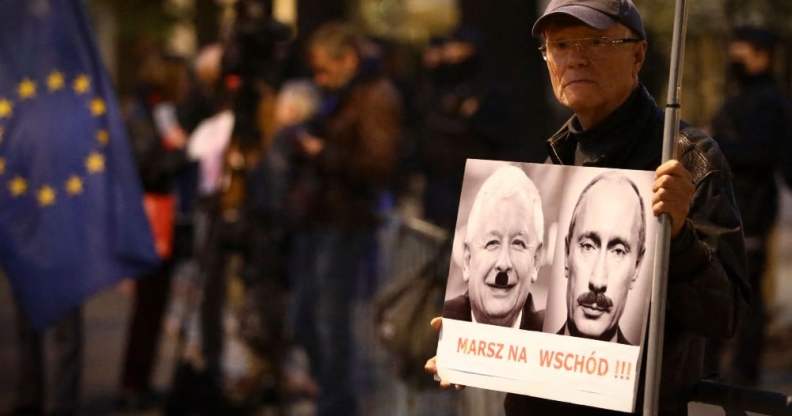Poland’s LGBT+ community at risk as top court ruling puts country on a path to ‘Polexit’

A man holds a sign with PiS leader Jaroslaw Kaczynski and Russian president Vladimir Putin at a protest in Warsaw, Poland on 7 October 2021 (Jaap Arriens/AFP/Getty)
Poland’s left-wing is raising alarm over a court ruling that rejects the primacy of EU law over national legislation, putting the country on a path towards a “legal Polexit”.
On Thursday (7 October) Poland’s constitutional tribunal ruled that some EU laws are in conflict with the country’s constitution, a decision that could have far-reaching consequences for the already embattled LGBT+ community.
Prime minister Mateusz Morawiecki brought the case to the country’s top court in March amid an ongoing dispute with the EU over LGBT+ rights, among other issues.
With the EU threatening to withhold funding to numerous “LGBT-free” zones across Poland, Morawieck argued that some provisions of EU treaties clashed with Poland’s highest law, and that EU institutions “act beyond the scope of their competences”.
The case represents the first time in EU history that a leader of a member state has questioned wholesale treaties in a constitutional court, and the decision could have serious ramifications for Poland’s most vulnerable communities.
The Polish LGBT+ activist Bart Staszweski speculated how PiS, the country’s homophobic ruling party, plans to use this victory.
“PiS knows that it is worth playing with a Polexit card because it is a signal that it is ready for a tough game. It checks how much determination the EU has to make hard demands,” he tweeted.
“In the perspective of elections in two years, PiS can only win. Someone else will clean up after them.”
Rafał Trzaskowski, the pro-LGBT+ mayor of Warsaw, also voiced fear for the future. “You did not believe in Polexit? Did you believe in PiS resolutions? Well, the next step on the way to Polexit has been made,” he said.
“It is difficult to imagine a more serious breach of the obligations of a member state than the ruling of the pseudo-tribunal under the dictation of Kaczyński.”
Robert Biedron, Poland’s first openly gay politician, suggested the ruling would allow the country’s politics to move ever closer towards Russia.
“It was fun, but it’s over. We took some euros, and now it’s time for rubles,” he said. “Although I have the impression that some of the ruling caste have their pockets stuffed with them for a long time.”
In a strongly-worded statement on Thursday, the European Commission maintained that “EU law has primacy over national law, including constitutional provisions.”
“All rulings by the European Court of Justice are binding on all member states’ authorities, including national courts,” it added, warning that it would “not hesitate to make use of its powers under the treaties to safeguard the uniform application and integrity of Union law”.

